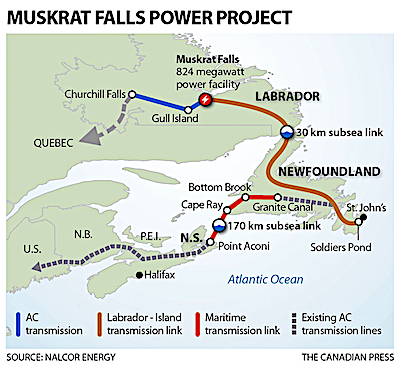27 Nov Nalcor didn’t hoodwink the UARB into approving the Maritime Link
Don’t be too quick to believe promoters of the Muskrat Falls Hydro Project hoodwinked the Nova Scotia Utility and Review Board into approving Emera’s role in the controversial project.
Nalcor executive Gilbert Bennett told the Muskrat Falls Inquiry yesterday the company deliberately low-balled cost estimates to help Emera win NSUARB approval for its share of the project.
“Nalcor and Emera announced a partnership to develop the massive hydro project in late 2010,” reports the CBC, “and it’s now become clear that Emera could only get approval from the Nova Scotia Utility and Review Board to proceed with the Maritime Link if the price of Muskrat power was affordable. The higher the capital cost, the higher the price consumers would have to pay for that electricity.”
 The Maritime Link is the subsea cable Emera built between Newfoundland and Cape Breton to carry power from Muskrat Falls to the rest of North America.
The Maritime Link is the subsea cable Emera built between Newfoundland and Cape Breton to carry power from Muskrat Falls to the rest of North America.
“I know there was a ceiling price,” the CBC quotes Bennett as saying. “If you went beyond that in comparing to (Emera’s) other alternatives, the Maritime Link and overall construct wasn’t going to be successful.”
Throw another log onto the campfire of hatred for Muskrat Falls by which Newfoundland media and opposition politicians have warmed themselves for years.
There’s only one problem with Bennett’s testimony: It doesn’t square with any of the known facts about how the Maritime Link was funded. Neither Emera nor Nova Scotia Power ever committed to pay a set price for Muskrat Falls power, and the NSUARB never approved a price for Muskrat power.
At the time of the negotiations, Newfoundland Premier Danny Williams was understandably determined not to repeat Joey Smallwood’s epic mistake of committing to a fixed price for selling Churchill Falls power to Hydro Quebec. He and Nova Scotia couldn’t agree on a price. The two sides were miles apart.
So instead of setting a fixed price, Emera agreed to build the Maritime Link, estimated to require 20 percent of overall project funding, in return for 20 percent of the power from Muskrat Falls. This effectively sidestepped any need to establish a price for the power. Before approving the swap, the NSUARB required Emera to cover any cost overruns on the Maritime Link, so the cost to NS Power ratepayers would be unaffected.
In short, there was never any risk to Nova Scotia Power customers, and the UARB wasn’t hoodwinked into anything.
In the end, Emera built the Maritime Link on budget, while costs for the Muskrat Falls end of the project soared. So we get 20% of the power for what’s turning out to be much less than 20% of the project’s overall cost.
Because their capital costs are so large, massive hydro projects almost always spark controversy when proposed and built. They almost always turn out to be blessings in the long run. They generally produce more power and last longer than conservative construction forecasts, and they never require fuel. Once construction costs are recovered, they produce free power with zero carbon emissions.
Muskrat Falls also incorporates a huge strategic advantage over most other hydro projects. It’s a factor the governments of Canada, Newfoundland, and Nova Scotia are well aware of, but the media and the public remain oblivious to. When the project is complete, it will provide both provinces with robust connections to the North American power grid for the first time in history.
Prior to construction of the Maritime Link and the Labrador-Island Transmission Link, which crosses the Strait of Belle Isle, Newfoundland had no power connection whatever to the rest of North America. Nova Scotia had only a single, low-capacity line New Brunswick whose capacity was long since maxed out.
Muskrat Falls provides a strong connection to the grid through Quebec, and a beefed-up connection through New Brunswick. This gives both provinces flexibility they never had to buy from whatever sources are cheapest and cleanest, and to sell excess power from wind, hydro, or eventually, tidal. Since the Maritime Link provides an alternative route to get hydro power out of Labrador, it gives Newfoundland leverage to negotiate with Quebec, which prefers to dictate terms for transportation of electrons.
Cost overruns may pose problems for Newfoundland, although I suspect history will show some of this fear was exaggerated. They pose no problem for Nova Scotia, because no one hoodwinked anyone, and the costs to ratepayers are exactly as forecast.
